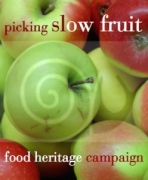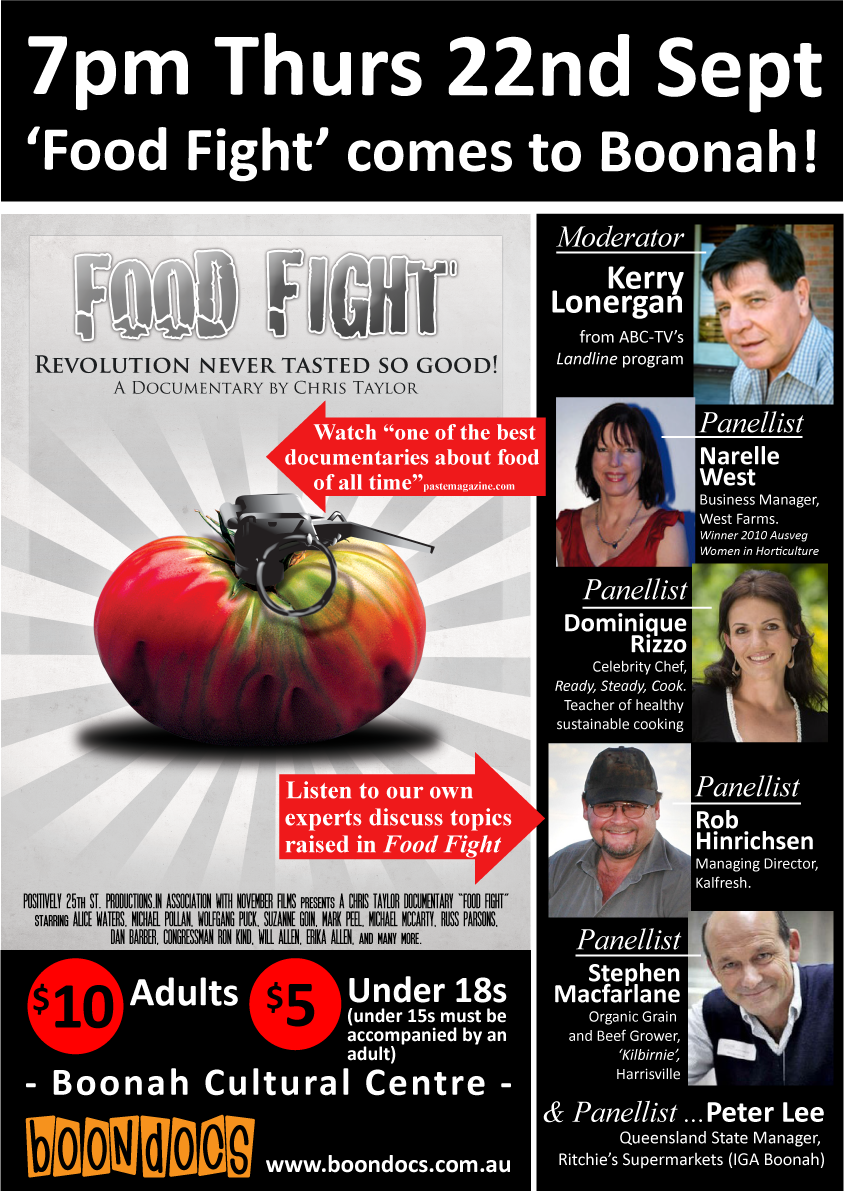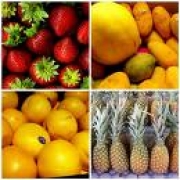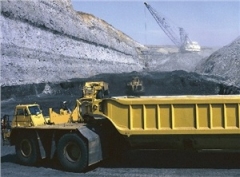
Logan and Albert Conservation Association

SLOW Food is an international not-for-profit organisation founded in 1986 to counteract fast food and fast life, the disappearance of local food traditions, people's dwindling interest in the food they eat, where it comes from, how it tastes and how our food choices affect the rest of the world - people, communities, animals, plants and the environment. There are branches in SEQ and locally at Mt Tamborine. Contacts for Queensland are available here.
the food they eat, where it comes from, how it tastes and how our food choices affect the rest of the world - people, communities, animals, plants and the environment. There are branches in SEQ and locally at Mt Tamborine. Contacts for Queensland are available here.
As the name suggests, Slow Food represents everything that fast food does not:
fresh, local, seasonal produce;
recipes handed down through generations;
sustainable farming practices (including organics);
small scale artisan food production; and
relaxed, leisurely dining in the company of family and friends.
Convivium (local Slow Food groups) activities introduce local foods and producers to both members and non-members, while Taste Workshops offer guided tastings with food experts. Find out more about the local Mt Tamborine group at their website linked here.
SLOW FRUIT is a current campaign to locate and capture images and information about sentinel fruit and nut trees and old orchards for Slow Food Australia's national Slow fruit register.

Boonah's own documentary and speaker festival 'Boondocs' will bring an international award-winning food documentary and a discussion panel of food industry experts together at the Boonah Cultural Centre in a special event for the Scenic Rim.
"Food Fight", by US filmmaker Chris Taylor, takes a fascinating look at how American agricultural policy and food culture developed in the 20th Century, and how the Californian food movement has created a counter-revolution against big agribusiness.
"Food Fight" won the Audience Award at the 2008 International Documentary Association;
Best Documentary 2008 HD FEST Los Angeles and
Best in Show-Documentary Indie Fest 2008. It's been rated as one of the top ten films about food of all time.
Following the screening of "Food Fight", Boondocs is honoured to have an expert discussion panel present on the night, comprising representatives from each sector of the food supply chain to bring the topics raised in this US doco to a local level.
See further details at new local food - based website under construction
A restaurant where sustainability is not measured in terms of financial profits.
A restaurant where environmental and ecological factors are equally important. An owner who walks the walk and envisions further methods of reducing the ecological footprint of the cafe.
Sydney restaurant Billy Kwong owner, Kylie Kwong,has been recognised with winning the inaugural Sustainability Award, a salute to restaurants that do their bit for the environment, as well as diners.
Five years ago, Kwong decided to lessen her restaurant's impact on the planet. She began by converting her conventional Chinese pantry to organics and biodynamics, painstakingly replacing ready-made oyster and hoisin sauces with additive- and preservative-free alternatives. "It's been great," she says. "And we've had to become really creative. Every week we'd look around and work out how to improve things. It was a complete revelation."
This is a woman who wears her convictions as a badge of pride - and lists her causes on her website, from Stephanie Alexander's Kitchen Garden Foundation to Fair Trade, Oxfam and the BFA (Biological Farmers of Australia, an organics certifying body).
Diners at Billy Kwong can donate to the restaurant's renewable energy credits program, purchased from a wind farm in the Chinese province of Hebei. And there's no bottled water; it's Sydney tap water run through a filter.
"Every time I think of a new provedore or using an ingredient, I ask whether it's sustainable," Kwong says. "I think about its carbon footprint, whether it's ethically produced and about serving food that has been harvested with love and integrity. Knowing the growers means you treat produce with respect. It's also a way of re-humanising the food chain."
Each of the top ten restaurants demonstrate how environmental sustainability can contribute to a profitable business and give back to the community.
Luke Nguyen's Vietnamese restaurant composts and recycles and uses a waterless wok burner. It uses line-caught fish; free-range pork and beef; and organic fruit, vegetables, coffee and poultry.
Courtney's Brasserie at Parramatta uses a blackboard map that traces a 200-kilometre radius around chef Paul Kuipers, in which he searches for local produce with an emphasis on seasonality and organics.
Eurolounge at Castle Hill is an example of thinking globally and acting locally, with the kitchen scraps and coffee grinds going to local gardeners, shredded paper recycled by a pet store and a menu seeking local produce and organic wines.
Becasse Chef Justin North buys straight from the farm gate, forming strong bonds with farmers who share his approach to sustainability. In return, he showcases their work in regular producer lunches.
From Sean's Panaroma we learn that every week for more than a decade, Sean Moran has taken scraps to his Blue Mountains hideaway to nurture the land, returning with the rewards, from fruit and herbs to eggs, chicken and even beef. Order herbal tea and they'll pick it fresh.
Food Connect is a unique, innovative fresh food distributor, with the dual goals of making clean, local food an affordable reality for as many families as possible, while working towards creating a sustainable food system for South East Queensland.
By eating food that is grown within a five hour radius of Brisbane - Logan City - Scenic Rim Region, Food Connect members cut down on their greenhouse gas emissions and reduce their carbon footprint. Several farmers in Scenic Rim are part of this local food system.
Farmers are paid fair prices and are offered incentives for farming in chemical free, ecologically sustainable ways.
Fresh fruit and vegetables are packed into boxes each morning, and the boxes are distributed to central pickup points for subscribers to pick up in the afternoons.
Most subscribers pick up their boxes on their way home from work, or from picking up their children from school, which further cuts down on fuel use and carbon emissions
Food Connect is 2009 Banksia People's Choice Award Winner
Food Connect is leading the way towards responsible food production and distribution in Australia. Unlike most national food distributors, major supermarket chains and produce box schemes, Food Connect sources its sustainable produce from local and regional family farms. They provide our family farmers a fair price for their produce, which encourages them to continue growing our food. This, in turn, helps our region to be more food secure. Furthermore, our local food distribution system ensures a significant reduction in the carbon emissions that are associated with transporting food long distances.
Your food choices matter!
As a Food Connect subscriber, your choice contributes in very tangible ways to building an ecologically and socially sustainable world.
Read more about them at their website www.foodconnect.com.au Read more about the awards on the website www.banksiafdn.com. This process in known as community supported agriculture CSA.
The Banksia Environmental Awards are based on
Achieving a Sustainable Australia
Recognising and rewarding environmental excellence
Promoting best practice principles
Contributing to action-learning and education
 Tom Philpott farms and cooks at Maverick Farms, a sustainable-agriculture nonprofit and small farm in the Blue Ridge Mountains of North Carolina. It is also an educational farm dedicated to promoting family farming as a community resource and reconnecting local food networks. His article Toward a less efficient and more robust food system is a version of an address delivered before the High Country Local Food Summit where he spoke about how to create a robust, diversified food system. Read the article here in http://www.grist.org/article/2009-toward-a-less-efficient-and-more-robust/
Tom Philpott farms and cooks at Maverick Farms, a sustainable-agriculture nonprofit and small farm in the Blue Ridge Mountains of North Carolina. It is also an educational farm dedicated to promoting family farming as a community resource and reconnecting local food networks. His article Toward a less efficient and more robust food system is a version of an address delivered before the High Country Local Food Summit where he spoke about how to create a robust, diversified food system. Read the article here in http://www.grist.org/article/2009-toward-a-less-efficient-and-more-robust/
The comparisons between specialized "city of the future" Manchester and Birmingham with a lot of little organizations doing bits and pieces of work for other little organizations ie working together, forming networks, and loose informal cooperatives provide food for thought. Birmingham flourished, Manchester did not.
Where will our food come from in the future?
 The ability to grow and interest in growing and eating our own locally produced food is growing. Alan Chenoweth (Chenoweth Environmental Planning & Landscape Architecture); Robert Pekin (Food Connect - an Australian leader in responsible food production and distribution) & Jan Power (Jan Powers Farmers Markets) are guest presenters at a free evening of presentations.
The ability to grow and interest in growing and eating our own locally produced food is growing. Alan Chenoweth (Chenoweth Environmental Planning & Landscape Architecture); Robert Pekin (Food Connect - an Australian leader in responsible food production and distribution) & Jan Power (Jan Powers Farmers Markets) are guest presenters at a free evening of presentations.
Title: PRODUCE, SHARE and ENJOY: Food in the city
What: Free public seminar featuring three exciting speakers
When: 06 May 2009 6:00pm
Where: The Brisbane room - Brisbane City Hall
Cost: FREE ADMISSION - BUT PLEASE BOOK A PLACE RSVP: 04 May 2009 12:00am 3220 2198 or Email www.brisinst.org.au
Food in the City ---- A step towards making Brisbane "local food smart"
 Coal 4 Breakfast? It's a question and a statement all in one, and a catchcry many Queensland farmers hope the State's city consumers will consider in the run-up to the March 21 State election. In 2008 a mining development licence was granted by the State government to Tarong Energy Corporation to develop a coal mine on prime agricultural land. There is a State Planning Policy SSP which claims it protects good quality agricultural land GQAL.
Coal 4 Breakfast? It's a question and a statement all in one, and a catchcry many Queensland farmers hope the State's city consumers will consider in the run-up to the March 21 State election. In 2008 a mining development licence was granted by the State government to Tarong Energy Corporation to develop a coal mine on prime agricultural land. There is a State Planning Policy SSP which claims it protects good quality agricultural land GQAL.
FutureFood Queensland, an apolitical body formed by a group of concerned farmers and rural businesspeople, this week launched a media blitz on Brisbane and its surrounds to make urban consumers aware of the issue and place it firmly on the election agenda.
Rising populations and incomes are expected to double the global demand for meat and milk from 229 to 465 million tonnes and 580 to 1043 million tonnes, respectively, by 2050. This will almost double the amount of greenhouse gases produced by livestock, dwarfing attempts to cut emissions elsewhere. Apart from all of us turning to a vegetarian diet, can anything be done to reduce greenhouse gas emissions from livestock?
Cows, sheep and goats may seem like innocent victims of humanity's appetite for meat, but when it comes to climate change they have a dark secret. Forget cars, planes or even power stations, some of the world's worst greenhouse gas emitters wander idly across rolling pastures chewing the cud, oblivious to the fact that their continuous belching (and to a lesser degree, farting) is warming the planet.
Take New Zealand, where 34.2 million sheep, 9.7 million cattle, 1.4 million deer and 155,000 goats emit 48 per cent of the country's greenhouse gases in the form of methane and nitrous oxide. Worldwide, livestock burps are responsible for 18 per cent of greenhouse gas emissions - more than produced from all forms of transport combined.
This article from New Scientist magazine issue 2687 is controversial but thought provoking.
Matters taken into consideration by the inquiry included, but were not restricted to:
The ACCC provided its report to the Assistant Treasurer and Minister for Competition Policy and Consumer Affairs on 31 July 2008.
The grocery inquiry report is available by following the links on this webpage. No printed version of this publication is available. There is at no cost.
Food Connect and Foresters ANA are collaborating to develop an action research project, aimed at identifying and eliminating barriers to local food access and CSA for all people in local communities.